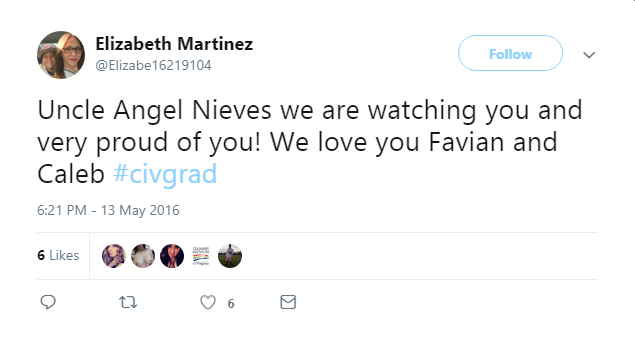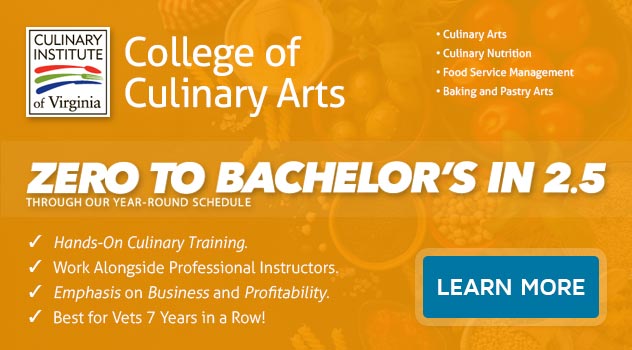Culinary Nutrition Degree: Fun Facts You Might Not Know About this Program
Written by Kristen Rohrer, Nutrition/Arts & Sciences Faculty at the Culinary Institute of Virginia
Let’s face it. Nowadays, people are paying much more attention than ever before to the food they are eating. They want to know where it comes from, the type of ingredients it contains and how it was cooked.
This changing paradigm makes the field of nutrition one of the fastest growing professions in the United States today. Not only does this mean more job opportunities than ever before for the professionally trained culinary nutritionist, but it also means flexibility in choosing a particular field of nutrition.
But Where Do Culinary Nutritionists Work?
Future graduates can work in a wide range of areas from healthcare, to the private sector, all the way to corporate health and wellness. The sky is truly the limit, particularly because nutrition and lifestyle choices are considered the gateway to preventing chronic disease and early mortality in every population.
According to the CDC, out of Virginia’s estimated 8.4 million residents, about 37% reported eating less than one fruit daily based on 2015 statistics. One in three of Virginia’s adult population meets the criteria for being overweight or obese, and with 15% of the adolescent population qualifying as overweight, this subgroup is following directly in the footsteps of their parents.
Statistically speaking, Virginia is in desperate need of nutritional support in the form of food education, meal planning for success, and evidence-based knowledge from a qualified culinary nutritionist in order to start making the right changes.
Future Developments in Culinary Nutrition
It seems that more research is published almost daily in the field of nutrition, particularly when it comes to the science behind metabolism, the interplay between genetics and environmental influences, and even barriers that may be preventing proper absorption in certain populations.
The field of culinary nutrition is moving toward an individualized or precision approach because in order to help address the current disease epidemic and change a reactive cycle to a proactive one, the “one-size-fits-all” mentality must be thrown out the proverbial window. What should it be replaced with?
The wave of the future in this field focuses on individualized analysis of environmental factors like stress, chemical exposure, the effects of toxic overload without proper nutritional support, family dynamics, and how all of these mediators influence a person’s underlying nutritional status either positively or negatively.
Many of these issues are severely underestimated, but they may be the true culprits that hinder weight loss and healing. Uncovering these less apparent barriers to health is the future of culinary nutrition and addressing them may also hold the key to success for your future clients.
From Foodie Fan to Culinary Nutritionist
Anyone can input food information into a nutritional tracker and generate a report on caloric intake as well as macronutrient status, but who wants to count calories and weigh food? Eating the right foods can alleviate this problem and directly fuel healing, boost energy, and revitalize every organ from the inside out.
The best news of all for prospective students is that personal interest in healthy eating and cooking techniques can fuel your motivation into the exciting new world of culinary nutrition. All it takes is a little inspiration and a lot of great research-based knowledge from an accredited program and you can go from a novice voice to an experienced practitioner with a formal degree.
Do you consider yourself a fan of food but want to learn more about the healing potential of the foods you enjoy making? How would you like your culinary dishes to be the living definition of ‘eating first with your eyes’ while also producing meals that make your taste buds sing? If you want to earn an Associate of Applied Science Degree in Culinary Arts and Applied Nutrition, ECPI University's Culinary Institute of Virginia offers this degree program at an accelerated pace. For more information about this exciting program, connect with a friendly admissions advisor today.
It could be the Best Decision You Ever Make!
DISCLAIMER – ECPI University makes no claim, warranty, or guarantee as to actual employability or earning potential to current, past or future students or graduates of any educational program we offer. The ECPI University website is published for informational purposes only. Every effort is made to ensure the accuracy of information contained on the ECPI.edu domain; however, no warranty of accuracy is made. No contractual rights, either expressed or implied, are created by its content.
Gainful Employment Information – Culinary Nutrition - Associate’s
For more information about ECPI University or any of our programs click here: http://www.ecpi.edu/ or http://ow.ly/Ca1ya.





